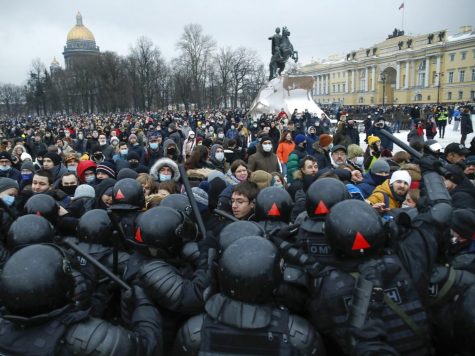Alexei Navalny Sent to Prison After Returning to Russia
Moscow City Court Press Service/Moscow City Court/TASS
Navalny was sentenced to two years and eight months in prison for violating the parole rules of a 2014 conviction (Courtesy of the Guardian).
On February 2, Alexei Navalny, Russian opposition leader and long-time critic of Russian President Vladimir Putin, was sentenced to two years and eight months in prison. He was accused of a violation of the limits imposed by a 2014 conviction of embezzlement that had been suspended. Navalny has previously stated that the conviction was political. As he was being sentenced, Navalny, who had been placed in a glass containment unit, laughed and made gestures toward his wife and supporters.
In August 2020, Navalny was flown to Germany after falling ill on a flight from Siberia to Moscow. While Russian officials have maintained that the doctors who treated Navalny in Siberia found no evidence of poisoning being the cause of his illness, labs in Germany, Sweden, and France, in addition to tests run by the Organization for the Prohibition of Chemical Weapons, found that Navalny had been exposed to Novichok, a deadly Soviet-era nerve agent. Navalny spent months recovering from the poisoning in a Berlin hospital. In January 2021, upon arriving in Russia from Germany, Navalny was detained by Russian authorities. He was imprisoned because he had not checked in with Russian authorities while being treated in Germany, which was a violation of the regulations set for the parole of his 2014 conviction.
Navalny’s arrest resulted in mass demonstrations by his supporters despite the freezing temperatures, as low as -58°F (-50°C). Thousands of people were arrested during these protests, including Navalny’s wife, Yulia. After Navalny was sentenced to prison, more protests occurred, and about 1,000 people were arrested.

World leaders have condemned Russia for arresting Navalny. United States Secretary of State Anthony Blinken has repeatedly called on Russia to release Navalny immediately. United Kingdom Prime Minister Boris Johnson and French President Emmanuel Macron have also demanded Navalny’s immediate release. Additionally, Josep Borrell Fontelles, the High Representative for Foreign Affairs and Security Policy for the European Union, Heiko Maas, Germany’s foreign minister, and Dominic Raab, the United Kingdom’s Foreign Secretary, have all called for Navalny to be released, among others.
While Navalny’s supporters plan to keep on protesting his arrest and world leaders are pressuring the Russian government to release him immediately, it is still not clear if he may serve the rest of his prison sentence or longer. Prosecutors are putting together more charges against Navalny for fraud and other infractions, which may extend his prison term to 10 years or more. What is clear, however, is that the Russian government, especially Putin, views Navalny as a serious threat.
Sources:
https://www.theguardian.com/world/2021/feb/02/russian-opposition-leader-alexei-navalny-jailed

